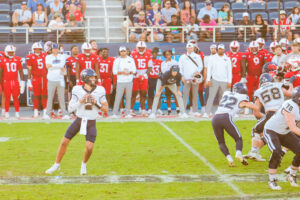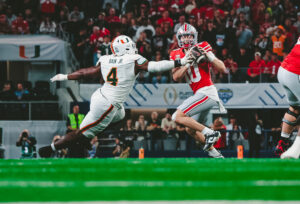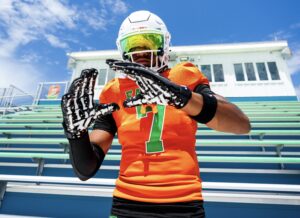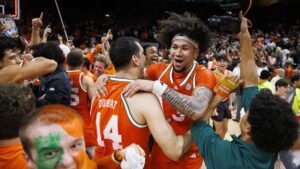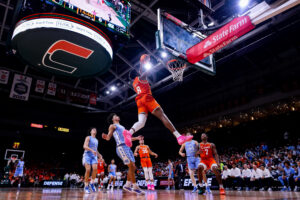On Tuesday (Oct. 29), the top decision-makers in the NCAA voted unanimously to allow student-athletes to profit off the use of their name and likeness in a manner that is “consistent with the collegiate model”.
In a statement by the NCAA, the board members said that all changes to the rules should allow student-athletes the same opportunities to make money as all other students, while making it clear that compensation for an athlete’s performance is prohibited. The release also states that the NCAA’s three divisions should ensure that the rules are transparent, and that there is a clear distinction between collegiate and professional opportunities.
The NCAA says the rules should be in place by January 2021.
“We must embrace change to provide the best possible experience for college athletes,” board chair and Ohio State vice president Michael Drake said in the release. “Additional flexibility in this area can and must continue to support college sports as a part of higher education. This modernization for the future is a natural extension of the numerous steps NCAA members have taken in recent years to improve support for student-athletes, including full cost of attendance and guaranteed scholarships.”
In the release, NCAA president Mark Emmert made sure to reiterate that this announcement would not turn student-athletes into professionals.
“The board’s action today creates a path to enhance opportunities for student-athletes while ensuring they compete against students and not professionals.” Emmert said.
The announcement comes following California’s “Fair Pay to Play Act”, which was signed by California governor Gavin Newsom in late September. The bill will take into effect beginning in June 2023.
Other states have also expressed interest in creating laws similar to California’s, including Florida governor Ron DeSantis, who voiced his support for a bill introduced in Florida that is similar to that of California’s. That bill could take into effect this summer if passed.
While Ohio State athletic director Gene Smith, who is a part of a working board that the NCAA formed in May to handle the issue, stated that the announcement is not similar to that of California’s, Smith did mention that the bill did prompt action from the NCAA.
The announcement is not the perfect solution to the situation, the announcement could lead to players getting paid for their likenesses being used on advertisements, much like FAU’s ‘Heisman in Paradise’ campaign for former running back Devin Singletary.
Following the announcement, FAU head coach Lane Kiffin shared his thoughts on the vote following FAU’s practice on Wednesday (Oct. 30).
“I’m all for if there is a way to pay the players and that might be the way to do it. You just have to be careful,” Kiffin said. “I’m not of this whole ‘Oh, your scholarship is enough.’ If you can get paid off what you do, then you should get paid. You just have to be careful or you will get into some recruiting issues and who can pay the guys.”
FAU defensive back Ahmon Ross also shared his support for an athlete’s ability to profit off his likeness.
“I feel like all athletes come from different backgrounds and just different outlets from where they’re from. A lot of these kids, without football, you wouldn’t see them at a four-year institution,” Ross said. “I look at it as an outlet to help them financially with their family, with themselves…Being able to profit off their likeness is another way to help their family and help their income.”
FAU junior linebacker Akileis Leroy also shared his opinion, although the announcement may not benefit him while he is in college.
“Even though I may not benefit from it, I feel like that’s a great idea,” Leroy said. “Most athletes, their likeness is everywhere…Athletes deserve stuff like that when they’re used, and they potentially don’t get to benefit from it.”

